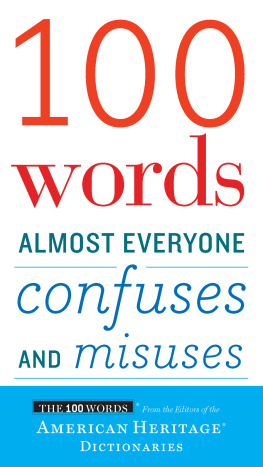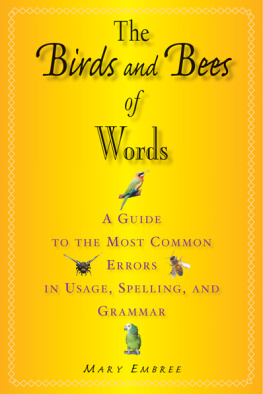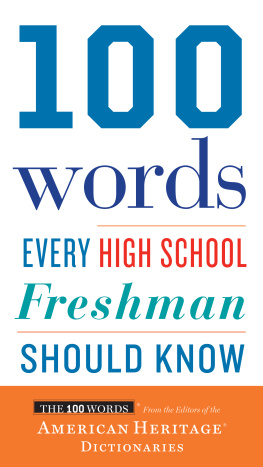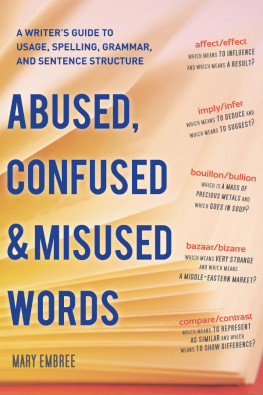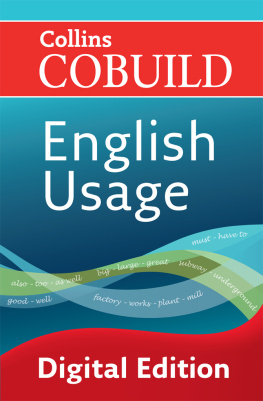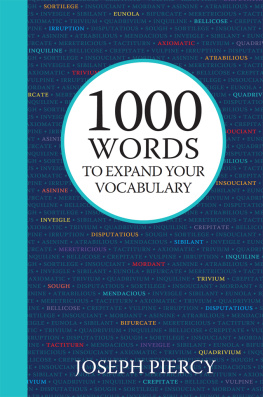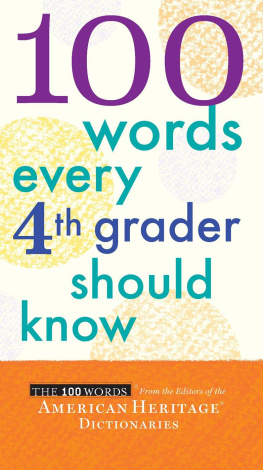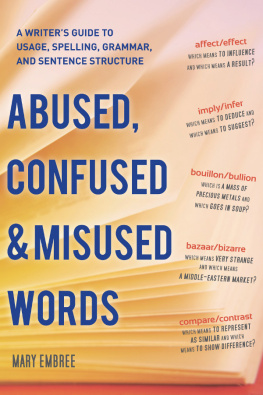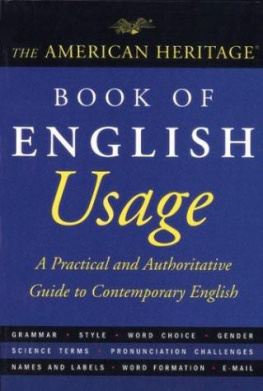EDITORIAL AND PRODUCTION STAFF OF THE
American Heritage Dictionaries
BRUCE NICHOLS ,Senior Vice President, Publisher, General Interest Group
STEVEN R. KLEINEDLER ,Executive Editor
PETER CHIPMAN ,Senior Editor
EMILY A. NEEVES ,Editorial Associate
CHRISTOPHER J. GRANNISS ,Database Production Supervisor
MARGARET ANNE MILES ,Art and Production Supervisor
The staff wishes to acknowledge former Executive Editor Joseph Pickett along with Nicholas A. Durlacher, Uchenna C. Ikonn, Katherine M. Isaacs, Susan I. Spitz, and Patrick Taylor for their contributions in the 2004 edition of this title.
THE 100 WORDS is a registered trademark of Houghton Mifflin Harcourt Publishing Company.
Copyright 2016, 2004 Houghton Mifflin Harcourt Publishing Company.
All rights reserved.
No part of this work may be reproduced or transmitted in any form or by any means, electronic or mechanical, including photocopying and recording, or by any information storage or retrieval system without the prior written permission of Houghton Mifflin Harcourt unless such copying is expressly permitted by federal copyright law. Address inquiries to Reference Permissions, Houghton Mifflin Harcourt, 222 Berkeley Street, Boston, MA 02116.
Visit our websites: hmhco.com and ahdictionary.com
THE LIBRARY OF CONGRESS HAS CATALOGED THE PRINT EDITION AS FOLLOWS:
Names: Houghton Mifflin Harcourt Publishing Company.
Title: 100 words almost everyone confuses and misuses / The 100 Words series
From the Editors of the American Heritage Dictionaries.
Other titles: One hundred words almost everyone confuses and misuses
Description: Boston : Houghton Mifflin Harcourt, [2016] | Series: 100 Words series | Reissue of the third book in the 100 Words series.
Identifiers: LCCN 2016005721 | ISBN 9780544791190 (paperback)
Subjects: LCSH: English languageUsage. | English languageHomonyms. |
English languageSynonyms and antonyms. | BISAC: REFERENCE / Directories. | REFERENCE / Word Lists.
Classification: LCC PE1460 .A15 2016 | DDC 428.1dc23 LC record available at https://lccn.loc.gov/2016005721
Cover design by Christopher Moisan Houghton Mifflin Harcourt
e ISBN 978-0-547-35026-4
v1.0916
Preface
The editors of the American Heritage dictionaries are pleased to reissue the third book in our 100 Words series, 100 Words Almost Everyone Confuses and Misuses, 12 years after its initial publication. This has long been one of the best sellers in this popular series, which has grown to include 14 titles. Language usage shifts and changes over time, and every year we ballot our Usage Panel (see ahdictionary.com/word/usagepanel.html for more information and the current list of Panelists) to analyze the most recent trends in language usage. This updated edition incorporates results from our latest ballots to reflect the current status of problematic usages.
This book is for people who remember that their English teachers had something to say about how these words are used, but often forget what exactly was said. How do flaunt and flout differ? Why do people mispronounce nuclear? Is kudos singular or plural? This book gives you the answers! Youll learn how things can go wrong, and youll learn how to make them right.
Entries, based on the content of the American Heritage dictionaries, are presented in an expanded layout thats easy to read and comprehend. Each word, such as presently, or each word group, such as affect/effect, is discussed in a note derived from the usage program of the American Heritage dictionaries. Additionally, we show the use of many words in context using quotations from a wide mix of classical novelists (Jane Austen, Pride and Prejudice; Mark Twain, The Adventures of Tom Sawyer), contemporary authors (Sebastian Junger, The Perfect Storm; William Least Heat-Moon, River-Horse) and current journalists (Jane E. Brody, New York Times; Chet Raymo, Boston Globe; Corby Kummer, Atlantic Monthly).
We hope that you will find 100 Words Almost Everyone Confuses and Misuses to be a helpful reference book for improving your confidence in speaking and writing.
Steve Kleinedler,
Executive Editor
Guide to the Entries
ENTRY WORD The 100 words that constitute this book are listed alphabetically. The entry words, along with inflected and derived forms, are divided into syllables by centered dots. These dots show you where you would break the word at the end of a line. The pronunciation of the word follows the entry word. Please see the key on for an explanation of the pronunciation system.
PART OF SPEECH At least one part of speech follows each entry word. The part of speech tells you the grammatical category that the word belongs to. Parts of speech include noun, adjective, adverb, transitive verb, and intransitive verb. (A transitive verb is a verb that needs an object to complete its meaning. Wash is a transitive verb in the sentence I washed the car. The direct object of wash is the car. An intransitive verb is one that does not take an object, as sleep in the sentence I slept for seven hours. Many verbs are both transitive and intransitive.)
INFLECTIONS A words inflected forms differ from the main entry form by the addition of a suffix or by a change in the base form to indicate grammatical features such as number, person, or tense. They are set in boldface type, divided into syllables, and given pronunciations as necessary. The past tense, past participle, and the third person singular present tense inflections of all verbs are shown. The plurals of nouns are shown when they are spelled in a way other than by adding s to the base form.
LABELS The USAGE PROBLEM label warns of possible difficulties involving grammar, diction, or writing style. A word or definition with this label is discussed in a Usage Note, as at .
ORDER OF SENSES Entries having more than one sense are arranged with the central and often the most commonly sought meanings first. In an entry with more than one part of speech, the senses are numbered in separate sequences after each part of speech, as at .
EXAMPLES OF USAGE Examples often follow the definitions and are set in italic type. These examples show the entry words in typical contexts. Sometimes the examples are quotations from authors of books. These quotations are shown within quotation marks, and the quotations author and source are shown.
ETYMOLOGIES Etymologies appear in square brackets following the last definition. An etymology traces the history of a word as far back in time as can be determined with reasonable certainty. The stage most closely preceding Modern English is given first, with each earlier stage following in sequence. A language name, linguistic form (in italics), and brief definition of the form are given for each stage of the derivation. To avoid redundancy, a language, form, or definition is not repeated if it is identical to the corresponding item in the immediately preceding stage. Occasionally, a form will be given that is not actually preserved in written documents but which scholars are confident did existsuch a form will be marked by an asterisk (*). The word from is used to indicate origin of any kind: by inheritance, borrowing, or derivation. When an etymology splits a compound word into parts, a colon introduces the parts and each element is then traced back to its origin, with those elements enclosed in parentheses.
Next page
